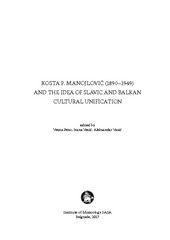Приказ основних података о документу
The Balkans as the Core of European Civilization? Kosta P. Manojlović’s collaboration with the Balkanski institut [Institute for Balkan Studies] in Belgrade (1934–1941)
| dc.contributor | Peno, Vesna | |
| dc.contributor | Vasić, Aleksandar | |
| dc.contributor | Vesić, Ivana | |
| dc.creator | Vesić, Ivana | |
| dc.date.accessioned | 2019-11-05T11:51:40Z | |
| dc.date.available | 2019-11-05T11:51:40Z | |
| dc.date.issued | 2017 | |
| dc.identifier.isbn | 978-86-80639-34-5 | |
| dc.identifier.uri | https://dais.sanu.ac.rs/handle/123456789/3649 | |
| dc.identifier.uri | https://dais.sanu.ac.rs/123456789/6604 | |
| dc.description.abstract | Representations of the Balkans as a cultural and political entity in Western European historical, political, diplomatic and journalistic narratives in the past centuries have for the past two decades occupied a prominent place in the research of numerous scholars. The most influential among them were the investigations of Maria Todorova, Božidar Jezernik, Vesna Goldsworthy, David Norris, Milica Bakić Hayden (according to Čolović 2013), and others, whose focus was oriented towards the deconstruction of the so-called “Balkanist discourse” with the aim of discovering the trajectory of negative stereotypes on the Balkans and Balkan peoples until the most recent times. Although inspired by Edward Said’s insights into the problem of Orientalism as a derogatory discourse and practice of Western European politicians, scholars, and journalists, these researchers of the phenomenon of “Balkanism” have mostly been unfamiliar with their historical predecessors who, as early as the 1930s, initiated extensive debate on similar issues in the specific geopolitical circumstances of the time. This group of journalists close to the Yugoslav political elite, supported by dozens of scholars from Yugoslavia, Bulgaria, Romania, Germany, Austria, and elsewhere, founded the Institute for Balkan Studies, an entity with the primary objective of launching a broad campaign in both academic and public circles of Balkan and European countries to combat the widespread negative preconceptions of Balkan peoples and culture. | en |
| dc.language.iso | en | sr |
| dc.publisher | Belgrade : Institute of Musicology SASA | sr |
| dc.relation | info:eu-repo/grantAgreement/MESTD/Basic Research (BR or ON)/177004/RS// | sr |
| dc.rights | openAccess | sr |
| dc.rights.uri | https://creativecommons.org/licenses/by-nc-nd/4.0/ | |
| dc.source | Kosta P. Manojlović (1890 - 1949) and the Idea of Slavic and Balkan Cultural Unification | sr |
| dc.subject | Kosta P. Manojlović | sr |
| dc.subject | Balkan nations | sr |
| dc.subject | unification of Yugoslav peoples | sr |
| dc.subject | Institute for Balkan Studies | sr |
| dc.title | The Balkans as the Core of European Civilization? Kosta P. Manojlović’s collaboration with the Balkanski institut [Institute for Balkan Studies] in Belgrade (1934–1941) | en |
| dc.type | bookPart | sr |
| dc.rights.license | BY-NC-ND | sr |
| dcterms.abstract | Весић, Ивана; | |
| dc.citation.spage | 127 | |
| dc.citation.epage | 140 | |
| dc.identifier.cobiss | 256243468 | |
| dc.type.version | publishedVersion | sr |
| dc.identifier.fulltext | http://dais.sanu.ac.rs/bitstream/id/50913/bitstream_50913.pdf | |
| dc.identifier.rcub | https://hdl.handle.net/21.15107/rcub_dais_6604 |

